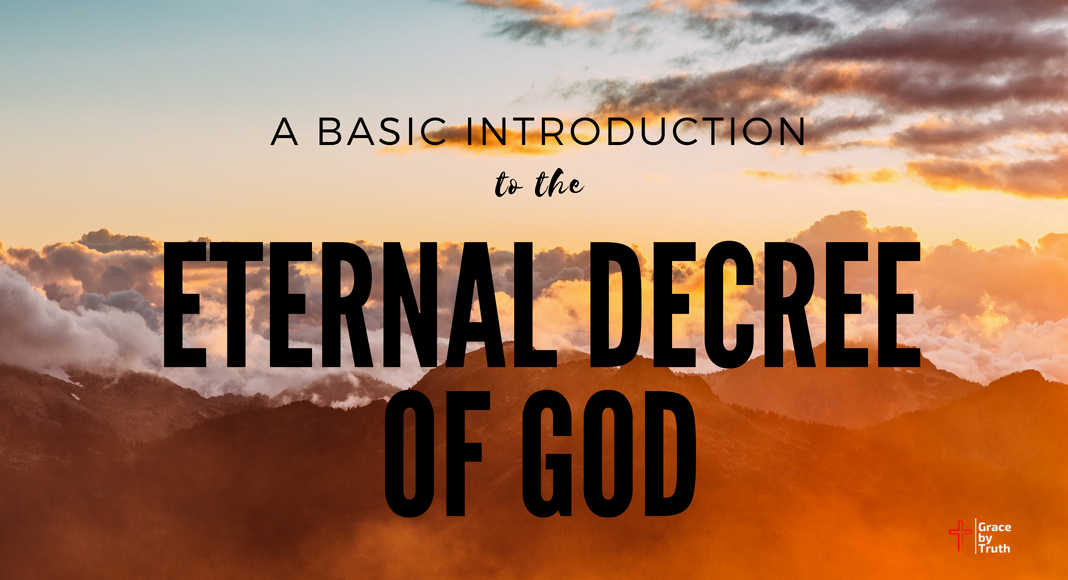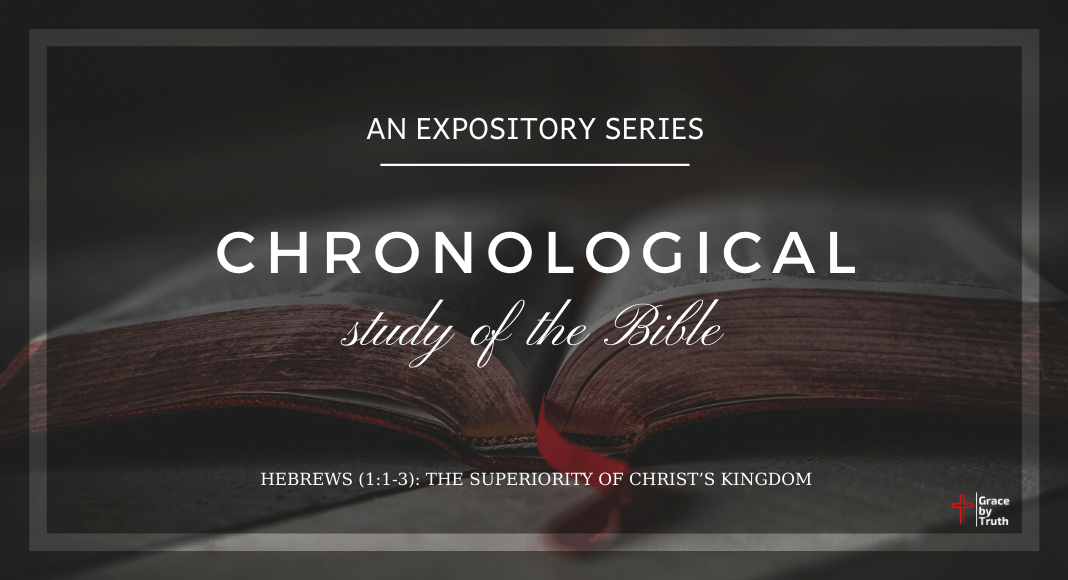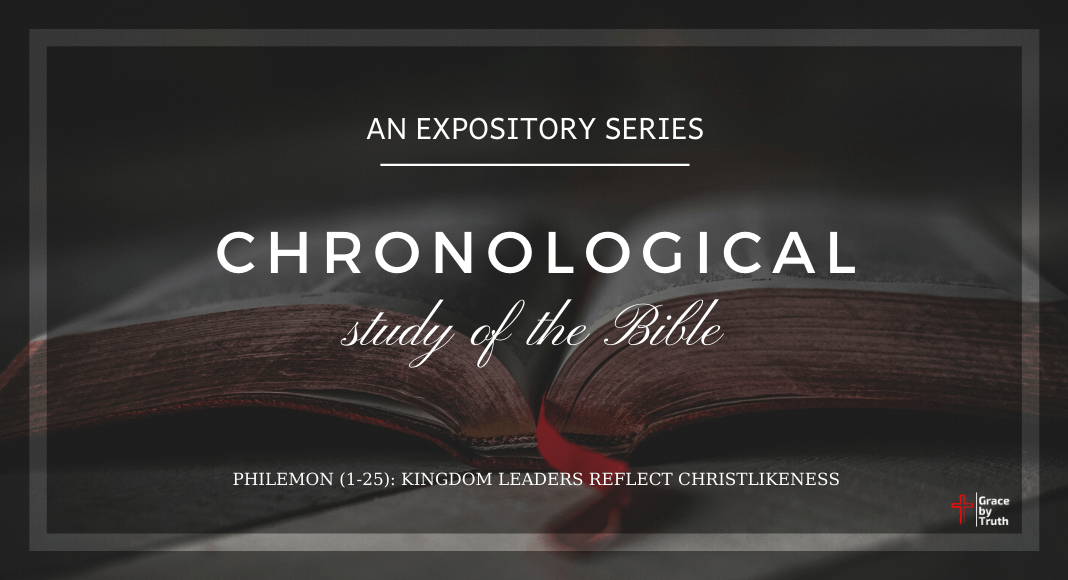Very few teachings or sermons in the church today deal with the doctrine of God’s eternal decree. The term decree is a term used to describe the outworking of God’s eternal plan or purpose. Sometimes the doctrine is referred to as the decrees of God but this is inaccurate. This is because God’s decree is actually one, all-encompassing, plan. However, what we see in the Bible is that this one plan contains many facets, much like a diamond shining under a light, detailing the various nuances of one beautiful stone. By tilting the diamond, the light catches and reflects a differing facet of the diamond’s beauty. Such is the case with God’s decree.
The decree of God is an inter-Trinitarian agreement, established in eternity past among the members of the Godhead which is designed to reveal the purpose and glory of God. It demonstrates God’s sovereign control over all things and over all events in human history. While the decree relates to what is and will be, it is important to note what God’s decree does not control or advance. God’s decree is not applicable to His own character and nature because He is the perfect being and as such, He could not improve upon Himself.
For example, “God did not…decree anything concerning Himself-as to His existence, His attributes, the mode of His subsistence in three Persons, or any inherent relationship or assumptions of responsibilities within the Godhead. Nor did God decree regarding His own existence and transitive acts as though He commanded Himself to create, to uphold, or to govern His universe. The decree of God relates to His acts which are immanent and intrinsic and are outside His own Being.”[1]
We see the decree reflected in Eph. 1:11, where Paul states that God “works all things to the counsel of His will.” This means that all things that have been purposed to come into existence have done so because God has either directly caused them to occur or because He has allowed them to be in His plan by means of secondary causes. As such, there only two options when pondering the implications of God’s Decree, either God is absolutely sovereign in His affairs over every event in the created order or He is not. If God is sovereign, then this rules out any notion that the Universe operates under the rule of chance, mathematical probability or blind fate. It also implies that man is still responsible to God for any sinful actions or behaviors that he commits in violating God’s moral standards.
Now that we have defined basic terms and concepts, let us examine some of the characteristics of the decree as it relates to the created order. To accomplish this, we must remember that what we are speaking of is fundamentally a plan. This plan touches every aspect and moment of life.
Characteristics of God’s Decree or Plan
God’s decree is a single plan that governs all things. Nothing is excluded from it. This means there is no possibility that anything that occurs is outside of the plan. As one of my favorite theologians, R.C. Sproul likes to say, there is not even one “maverick molecule” running loose in the universe.[2] What exists in the plan exists under God’s ultimate control without any possibility of anything in the plan catching Him off guard.
As previously stated, God’s decree was formulated in eternity past, before Genesis 1:1 but the outworking of the plan is made manifest in time and space. For example, Scripture reveals that the believer was chosen for salvation by God in eternity past before he or she ever existed. The believer’s salvation and calling were also included in God’s decree from eternity past (2 Tim. 1:9).
“who has saved us and called us with a holy calling, not according to our works, but according to His own purpose and grace which was granted us in Christ Jesus from all eternity,”[3]
In this verse, Paul emphasized that the plan was based upon and according to, “His [God’s] own purpose.” The term purpose in the Greek text prothesin emphasizes God’s resolve or decision in His effectively saving the believer. Though it was done in eternity past, it becomes actualized in time, at the moment a person hears the Gospel and believes. This is how the plan is worked out in human affairs but it also includes heavenly affairs as well.
For example, the decision for the Second Person of the Godhead, Jesus Christ, to take on human flesh and die on a cross was also a part of this decree as described by Peter, before the foundation of the world (1 Peter 1:20), yet this decision involved no human intervention. It was worked out among the members of the Godhead to include both material and immaterial contingencies to enact and complete God’s plan for His glory and man’s ultimate salvation and restoration. As such, we can say that God’s decree or plan is a wise plan because it is God who made the plan and initiated it.
Since God initiated the plan it is perfect. One may also conclude that God does not adjust the plan according to human responses. Rather, one’s responses, decisions and actions works in conjunction with the plan as it unfolds in time. No matter what one person decides to do, he or she cannot miss the plan. Even man’s sin is accounted for in God’s ultimate plan though God is not responsible for the sin man commits. This is because “…human choices and human actions are a part of the overall providential scheme of things, and God brings His will to pass by means of the free decisions of moral agents. The fact that our free decisions fit into this overarching plan in no way lessen the reality of that freedom.”[4] This is because there are two distinct facets of the plan which is revealed in God’s will that accounts for God’s allowing the existence of sin yet not being responsible for it.
God’s Decree is initiated by His Will
The plan or decree is initiated by God’s will. This is the power of choice that God used to enact the decree. From a human perspective, it is easier to study God’s will when we look at it from seeing two facets of God’s will that are revealed to us in Scripture, His directive will and God’s permissive will.[5]
God’s directive will, is that will whereby He directs or causes whatever comes to pass. It does not change. It encompasses the ends of all things as well as the means for accomplishing those ends and is the most difficult aspect for believers to comprehend because of our being temporally grounded in time and space. We see life on a moment by moment basis where we come to know things only after they happen, whereas God sees the beginning and the end at the same time without having to learn anything new because He already knows all things. The other facet of God’s will is something that most Christians are much more familiar with because it is here that God’s will has direct bearing on our daily choices regarding what God expects of us morally. This falls under the category of God’s permissive will.
God’s permissive will includes those things that God allows in His plan such as sin, brought about through secondary causes, namely man’s choosing to engage in sinful acts. For example, sinful acts in a person’s life do not frustrate God’s plan though they violate His moral standards. But God does not cause anyone to sin. As Berkof notes, “A distinction must be made between the decree and its execution. God’s so ordering the universe that man will pursue a certain course of action, is also quite different thing from His commanding him to do so.”[6] Man is responsible for the sin born out of his own heart and examples of how the two concepts of God’s decree and human sinful correlate are again found all throughout the Bible. For the sake of brevity, let us consider just one example.
When the people of Israel demanded to have a king like all the other nations, they sinned against God because they were living under a theocracy (1 Sam. 8:5-9, 19-22). God was to be their King. However, God had already made provisions and rules for kings in the Mosaic Law, as well as ordaining that kings would come from Abraham’s seed. The people were responsible for their sin in asking for a king yet their sin was included in God’s plan or decree. Do you see how God’s plan and human responsibility coincide? The answer regarding being responsible for sin is revealed by man’s responses, decisions and actions in rebelling against God’s standards. Enns describes the supposed dilemma as such:
“Although all things are encompassed in the decree, man is responsible for sinful actions. This is known as an antinomy and is important in understanding the concept that although God is sovereign and has decreed all things, nonetheless man is responsible for sinful acts. Antinomy comes from the Greek word anti, meaning “against,” and nomos, meaning “law,” hence, an antinomy is something that is contrary to law or contrary to human understanding. An antinomy, of course, is such only in the mind of man; with God there is no antinomy.”[7]
What Enns is setting forth, is that man is responsible for the sin he commits because he, of his own volition, chooses it. The secondary causes, which include his will, desires and motivation, are those causes that make him accountable to God. Does this make things a bit easier to understand when contemplating God’s decree as it is worked out in the realm of human responsibility?
Conclusion
What this brief introduction has demonstrated is that God’s decree or plan has very practical ramifications for the Christian life. First, it shows us that God is worthy to be praised and worshipped because He is the Supreme Being. There is none like Him or none that can thwart His purposes. We can entrust our entire being to His gracious hands.
Next, the decree of God teaches us that there has never been a time when God has not known us. Our salvation in Christ Jesus was accomplished before the foundation of the world and could have never been otherwise because it was purposed according to God’s directive will. We should therefore be humbled and rejoice at this great salvation that is ours in Christ.
Finally, God’s decree teaches us that His permissive will allows evil in His plan but that He will hold evil men accountable and that even though it does not seem this way now, there is coming a day of reckoning where all wrongs will be set right for the sin in which man freely chose to engage. Since we look forward to this day, may the doctrine of the decree of God be a most powerful motivation for us to be about the task of honoring and pleasing our LORD, in whom, our salvation is objectively secure and the Lord will be victoriously revealed.
BIBLIOGRAPHY
[1] Lewis Sperry Chafer, “Biblical Theism Divine Decrees” Bibliotheca Sacra, Vol. 96 (1939): 138-163.
[2] R.C. Sproul, Chosen By God (Wheaton: Tyndale House, 1986), 27.
[3] Unless otherwise stated, all Scripture is taken from the New American Standard Version of the Bible.
[4] R. C. Sproul, Does God Control Everything? First edition., vol. 14, The Crucial Questions Series (Orlando, FL: Reformation Trust, 2012), 54.
[5] Some theologians prefer the term “Decretive or Decreed Will” but I have personally found the other term to be more useful in teaching platforms because it is God who ultimately directs whatsoever comes to pass yet when contrasted with the term permissive will, it allows for a greater distinction in understanding how God permits sin in the outworking of His decree or plan without causing greater confusion regarding sin’s liability.
[6] Louis Berkof, Systematic Theology (Grand Rapids: Eerdmans Publishing, 1996), 103.
[7] Paul Enns, The Moody Handbook of Theology (Chicago: Moody Press, 1989), 205.
ABOUT
Grace by Truth is known for delivering the precise and deep study of biblical truth in service to each other and the church.
CONTACT
CURRENT STUDY
MORE THEOLOGY ARTICLES
New Testament Lists of Spiritual Gifts
Spiritual Gift - A Spiritual Gift is a sovereignly and supernaturally bestowed enablement given by the Holy Spirit to every believer. The purpose of each gift is for the believer to use his gift for the spiritual edification of fellow believers in the Church, which...
10 Attributes of God
1. Sovereign God is absolutely and universally supreme. He is the Most High, the Lord of Heaven and earth. He is subject to none, influenced by none, and absolutely independent. God does as he pleases, only as he pleases, always as he pleases. None can thwart Him or...
Can a Christian Lose His Rewards?
Hebrews 5:11-6:12 and The Believer’s Loss of Rewards Throughout the Church’s history, many controversies have arisen as a result of the third warning found in the sixth chapter of the book of Hebrews. The debate found in these controversies touches every aspect of the...







